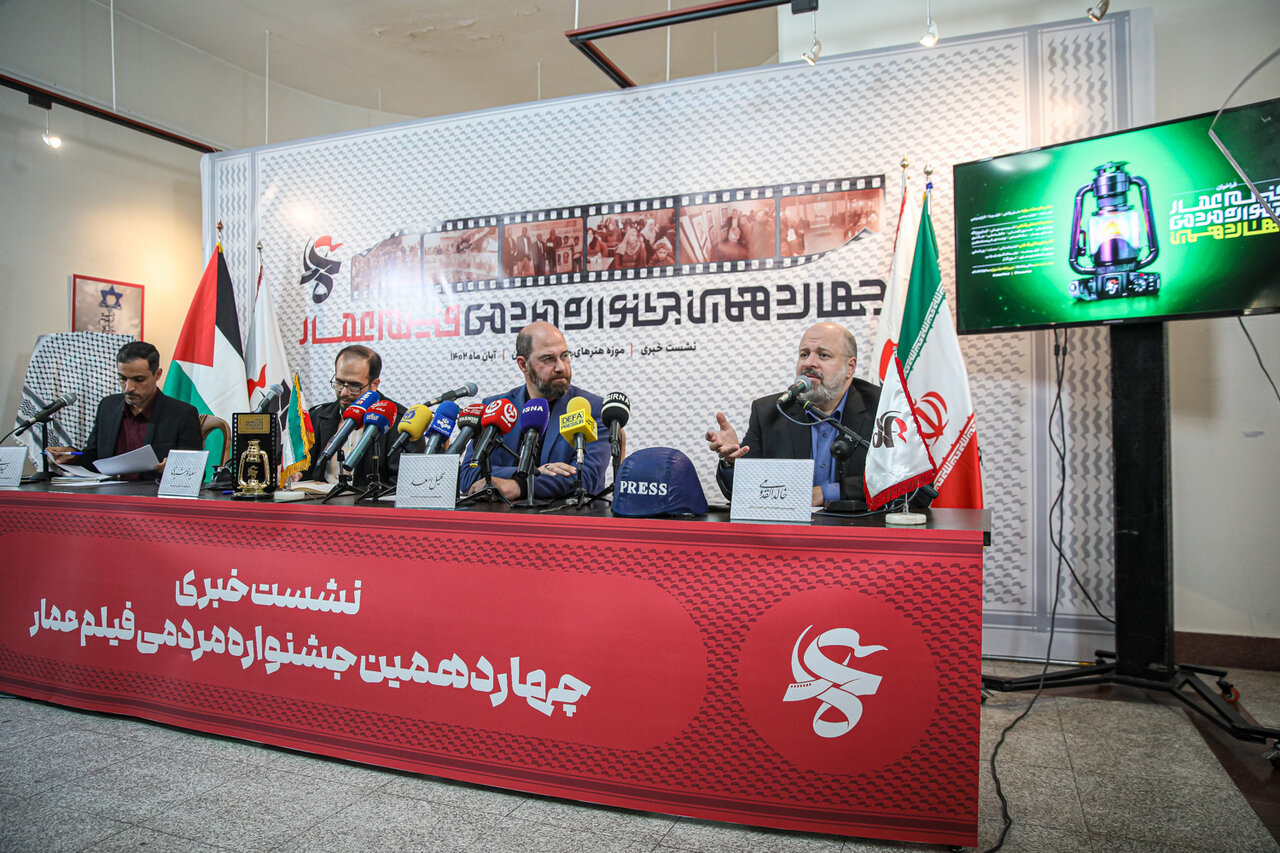Palestinian cause takes center stage at Ammar Popular Film Festival

TEHRAN – The 14th edition of Ammar Popular Film Festival will bring attention to the Palestinian cause as the main theme of the event, the organizers have announced.
Saeid Khorshidi, the head of the festival's policy council, during a press conference at Palestine Museum of Contemporary Art in Tehran on Sunday, highlighted the speeches of Ayatollah Ali Khamenei, the leader of the Islamic Revolution, which inspired the decision to shed light on the Palestinian struggle for justice.
Khorshidi emphasized the significance of Gaza as a symbol of human captivity in the current global order, stating that the festival aims to support the Palestinian people's efforts to bring about a new world order.
The Ammar Popular Film Festival, since its inception, has aimed to challenge the censorship and neglect imposed by mainstream media, stated Khorshidi.
He emphasized the festival's commitment to shedding light on the struggles faced by marginalized individuals, who often remain unseen by mainstream media outlets.
Khorshidi highlighted that the festival serves as a platform and voice for artists involved in the resistance movement, offering support to the global artistic community that is often overlooked by the world.
He further noted that Gaza, in its fight against the prevailing global order, represents the quest to break free from human captivity and pave the way for a new world order.
The recent events in Palestine have witnessed media movements that have successfully challenged the dominance of mainstream media outlets, thereby undermining their authority, noted Saeid Khorshidi.
He highlighted the growing support and involvement of people in Europe who have stepped forward to defend Gaza. Khorshidi emphasized the festival's responsibility to depict the struggles and resistance of Palestine through the lens of art.
Khorshidi further emphasized the significance of Palestine, which has become a living testimony to the atrocities committed by Western civilization. He viewed this as an opportunity to bring awareness to the plight of captive individuals and offer them hope for liberation through artistic representation.
He also expressed pride in the previous collaborations with Palestinian artists, including organizing a week of film screenings in Gaza during previous festival editions. Khorshidi expressed hope that with the triumph of the Palestinian people and Gaza, similar events can be held throughout Palestine, bringing together Palestinian and resistance artists in their shared pursuit of freedom and justice.
For his part, Soheil As'ad, the festival's secretary, highlighted the distortion of Iran's image in Western media and emphasized the role of the Ammar festival in counteracting this misrepresentation.
He stated that the current perception of Iran, both within and outside the country, does not accurately reflect its true essence.
As'ad stressed the importance of the festival's diversity and multidimensionality in presenting a more authentic and nuanced portrayal of Iran.
The Ammar festival is often recognized as a platform for revolution and revolutionary art, he noted.
However, the festival encompasses more than just the economic aspect and strives for authenticity, he added.
He explained that only a fraction of the art, media, and cinema equation is represented in Ammar festival.
As'ad emphasized the crucial unity between producers and audiences, asserting that the festival offers an opportunity for the audience to become active participants as both creators and viewers of art.
Continuing his statement, As'ad pointed out the existing equation between authority and art worldwide. He highlighted how those in power often utilize art as a means to shape public opinion.
However, in Ammar festival, this equation has been altered, as it is the people themselves who have become influential in shaping public opinion through their own artistic expressions, he said.
As'ad emphasized that Ammar festival eliminates the need for intermediaries between the production and consumption of art, thereby creating a platform for critical thinking and fostering a culture that is open to constructive criticism.
Additionally, Khaled Al-Qaddoumi, the representative of the Palestinian Islamic Resistance Movement (Hamas) in Iran, highlighted the direct and indirect repercussions of the Zionist regime's crimes on a global scale.
Al-Qaddoumi emphasized that the issue of Palestine represents a battle between right and wrong, and while the battlefield may be located in Palestine, its consequences extend beyond the region and have far-reaching effects globally.
Al-Qaddoumi further highlighted the immense sacrifices made by the Palestinian people, including the loss of lives and the destruction of their homes. However, he emphasized that the spirit of martyrdom keeps their cause alive and resilient, and their struggle continues unabated.
He also highlighted the critical need to examine the enemy's media policy amidst the recent surge of Palestinians being martyred during the Al-Aqsa storm.
Al-Qaddoumi pointed out that the enemy has adopted a clandestine media strategy that suppresses the truth, preventing local journalists from accessing the conflict zone.
Al-Qaddoumi emphasized the necessity of seeking truth and constructing narratives based on reality, cautioning against the Israeli strategy of resorting to marketing tactics.
He stated that victory in this war belongs to the Palestinian people, not through deceit and manipulation, but because of the deep human empathy and understanding of one another's pain.
Emphasizing the importance of media presence to support Palestine, he called upon individuals to be present on the ground and convey the accurate narrative of the situation.
Ammar Popular Film Festival will be held in December in Tehran and several other cities and villages across the country.
SAB/
